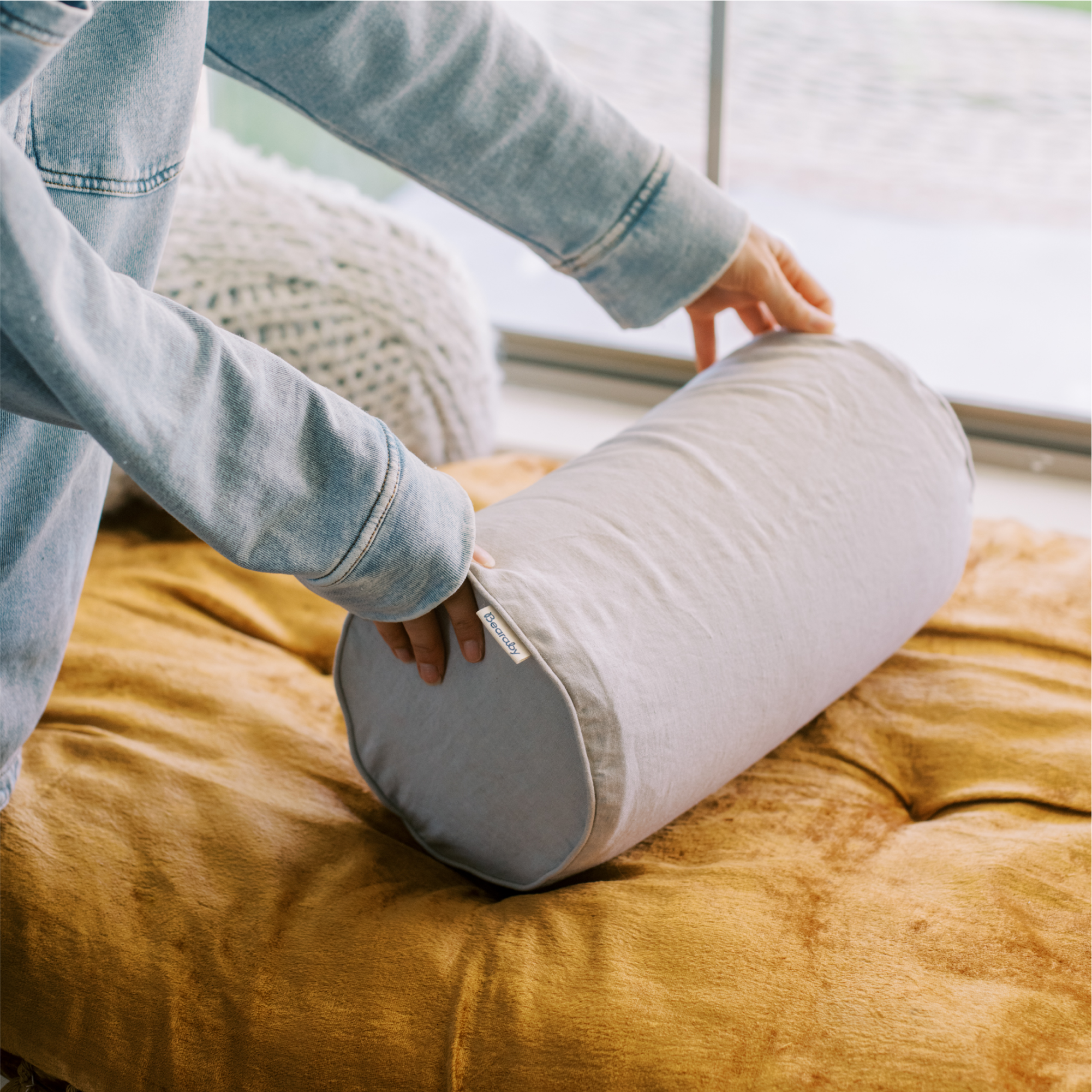11 Practical Tips And Tricks For Sleep Deprived Moms
Motherhood is a beautiful and fulfilling journey, but it often comes with its fair share of sleepless nights and exhaustion. Sleep deprivation from frequent feedings, diaper changes and a fussy baby can have a profound impact on moms, affecting their physical and mental well-being. From setting a nap time to creating a relaxing bedtime routine, explore strategies that can make a significant difference in achieving restful sleep

Bearassentials
Restful sleep is designed to help your body and mind recover
New parents lose about two hours of sleep per night for the first five months after bringing home their baby
Sleeping with a weighted blanket can help moms get more deeper, quality sleep in the hours that they get some shuteye
Did you know?
Newborns take frequent naps from 2 to 4 hours and new moms can take short naps with them to compensate for quality sleep at night.
As a mom, getting a good night's sleep can often feel like an impossible dream. The demands of motherhood can leave you feeling exhausted and sleep deprived. However, prioritizing your sleep is crucial for your overall well-being and your ability to take care of your little ones. If you're wondering how to improve sleep for moms, we've got you covered. Here are 11 practical tips and tricks to help you get the restful sleep you deserve
1. Set A Time To Take A Nap
Napping can be a game-changer for sleep-deprived moms. When your little one is down for a nap, take advantage of that precious quiet time and allow yourself to rest as well. Even a short power nap can recharge your energy levels and improve your mood. Set a specific time each day to take a nap, and make it a non-negotiable part of your daily routine
To get deeper restful sleep during your naps, a weighted blanket like our Cotton Napper can help. This buttery soft and breathable organic cotton weighted blanket is ideal for all seasons and aids naturally deeper sleep cycles. The weight on your body stimulates the production of serotonin (the happy hormone), reduces cortisol (the stress hormone), and increases melatonin, which helps you fall (and stay) asleep.
Cotton Napper

Dreamy, buttery softness
Calms body & mind for deeper sleep
Hand-knitted huggable comfort
It's Napper Time
Understanding The Side Effects Of Sleep Deprivation
Sleep deprivation can have significant consequences on your physical and mental well-being. As a sleep-deprived mom, you may experience a range of side effects that can affect your daily life. Common side effects of sleep deprivation include:
Fatigue And Lack of Energy: Sleep deprivation can leave you feeling constantly tired and drained of energy. This can make it difficult to keep up with the demands of motherhood.
Impaired Cognitive Function: Lack of sleep can impair your cognitive abilities, making it challenging to concentrate, think clearly, and make decisions.
Mood Disturbances: Sleep deprivation often leads to mood disturbances such as irritability, mood swings, and increased susceptibility to stress. These emotional fluctuations can make it more challenging to navigate the ups and downs of parenting
Weakened Immune System: Prolonged sleep deprivation can weaken your immune system, making you more susceptible to illnesses and infections. As a mom, staying healthy is crucial to take care of your little ones, so prioritizing sleep becomes even more important.
Increased Risk Of Postpartum Depression: Sleep deprivation can exacerbate the risk of postpartum depression in new mothers. The hormonal changes combined with the physical and emotional demands of caring for a newborn can be overwhelming, and the lack of sleep can further contribute to feelings of sadness, anxiety, and depression.

2. Have The Right Meals Before Bedtime
What you eat and drink can significantly impact your sleep quality. Avoid heavy meals and spicy foods close to bedtime, as they can cause indigestion and disrupt your sleep. Instead, opt for lighter, nutritious meals that are easier to digest.
Additionally, consider having a small snack before bed that contains sleep-promoting nutrients like tryptophan and magnesium. A banana with a spoonful of almond butter or a small handful of nuts can do the trick
Simple tweaks to your diet, especially before bedtime can drastically change the quality of your sleep. The food you consume is also directly related to the production of serotonin in your body, a key hormone that — along with vitamin B6, B12 and folic acid — helps promote healthy sleep
3. Maintain A Comfortable Room Temperature
Creating a sleep-friendly environment is crucial for improving your sleep quality. One important factor to consider is the room temperature.
Aim to keep your bedroom cool, ideally between 60 to 67 degrees Fahrenheit (15 to 19 degrees Celsius). This temperature range has been found to promote better sleep. Adjust your thermostat, air conditioning or use a fan to achieve the desired temperature and create a cozy sleeping space.
If you sleep hot and get sweaty while you sleep, a cooling weighted blanket like our Tree Napper, can help you sleep and feel calmer, naturally. Using cooling materials like TENCEL, also keep a lookout for the materials used in your bedding to regulate your body temperature and stay comfortable while you sleep
What is the best room temperature for infants?
For moms to sleep soundly, it’s also essential to keep an eye out for the room temperature where an infant sleeps. Infants cannot naturally regulate their body temperature and may benefit from a bedroom that is one or two degrees warmer, up to 69 degrees Fahrenheit (20.5 degrees Celsius). As their bodies are smaller and still developing, they are more sensitive to changes in ambient temperature.
4. Limit Electronics Before Bed
The blue light emitted by electronic devices such as smartphones, tablets, and laptops can interfere with your body's natural sleep-wake cycle. Make it a habit to limit your screen time in the evening, especially within an hour or two before bedtime.
Instead, engage in relaxing activities like reading a book, taking a warm bath, or practicing gentle stretching or meditation exercises. These calming rituals can help signal your body that it's time to wind down and prepare for sleep.
5. Exercise Daily
Regular physical activity can work wonders for your sleep quality. Engaging in exercise during the day helps release endorphins, reduce stress, and improve your overall mood.
Aim for at least 30 minutes of moderate-intensity exercise, such as brisk walking, jogging, or yoga. You can also try to keep it simple, when you’re sleep deprived and any form of exercise can seem even more tiring. Opt out of any high intensity and strength workouts and go for a quick walk to your nearest coffee shop, or even go to the shops and get some movement with your little one in the stroller.
However, try to avoid exercising too close to bedtime, as it can have an energizing effect and make it more difficult to fall asleep
6. Watch Your Caffeine And Alcohol Intake
While a cup of coffee or a glass of wine may provide temporary relief, excessive caffeine and alcohol consumption can disrupt your sleep patterns.
Caffeine is a stimulant that can stay in your system for hours, making it harder to fall asleep and stay asleep. Limit your caffeine intake, especially in the afternoon and evening.
Similarly, while alcohol may initially make you feel drowsy, it can disrupt the quality of your sleep, leading to frequent awakenings and daytime fatigue. Opt for herbal tea or decaffeinated alternatives in the evening, and consume alcohol in moderation, if at all. A small amount of alcohol if you are breastfeeding, may also impact the sleep of your infant and lead to further sleep deprivation.
7. Create A Calming Sleep Space
In an ideal world, your bedroom is the room in your house where you feel most relaxed. Establishing a consistent bedtime routine in a calming environment can signal to your body that it's time to wind down and prepare for sleep.
Create a calming sleep space by engaging in activities that help you relax and unwind, such as taking a warm bath, practicing deep breathing exercises, or listening to your favorite calming music or white noise.
Make sure your bedroom is dark, quiet and cool, removing any items that cause any unnecessary clutter and distractions and make use of calming natural products that help you sleep better like our Cotton Napper weighted blanket.

8. Remove Screens
Nowadays it’s easy to find yourself looking at screens all day long. If you use a laptop at work, watch TV at night, and scroll on your phone in between, you might find it hard to name a time of day when you aren’t in front of a screen. Unfortunately, this can cause sleep problems in the long run for you and your baby.
If you're lying awake tired and sleep deprived, having your phone in hand can make things even worse. You might find yourself “doomscrolling”, reading through bad news and negative comments with no end in sight.
Try setting a time to put your screens away each night. This will give your bedtime routine a clear beginning while helping your eyes and mind rest before sleep.
9. Delegate And Share Responsibilities
As a mom, it's important to remember that you don't have to do everything on your own. And not getting enough rest when you’re trying to do everything on your own can have serious implications on your health in the long run.
Delegate tasks, skip daily household chores and share responsibilities with your partner or other family members. By dividing household chores and parenting duties, you can create more time for rest and relaxation.
Parenting is a beautiful process that should be shared between you and your partner, by taking turns with feedings, diaper changes and other nighttime baby duties. Moms who breastfeed can also pump breast milk and store it earlier in the day so that their partner can give a nighttime bottle feed to the baby, allowing mom to get some extra shuteye.
Remember, it's okay to ask for help when you need it.
10. Practice Stress Management Techniques
Stress and anxiety can interfere with your ability to fall asleep and stay asleep. By incorporating simple stress management techniques into your daily routine, you can promote relaxation and improve your sleep.
Try deep breathing exercises, progressive muscle relaxation, or guided meditation before bed. These practices can help calm your mind and prepare your body for a restful night's sleep.
That feeling of helplessness will also subside with time as your little one grows. As with many things in life, being a new mom can be quite stressful, but thankfully there are phases and this difficult time of being sleep deprived will soon pass.
11. Establish Consistent Sleep And Wake Times
Creating a consistent sleep schedule can regulate your body's internal clock and improve your sleep quality
Aim to go to bed and wake up at the same time every day, even on weekends. This regular sleep-wake pattern helps synchronize your body's natural sleep rhythms and makes it easier to fall asleep and wake up feeling refreshed. Though it may seem difficult at first with nighttime awakenings by your baby, try to turn in and wake up in a routine.
Even after establishing these patterns, if you still feel extremely low and fatigued, reach out to a medical professional to check if you might have a sleep disorder or postpartum depression.
Conclusion
Motherhood can be incredibly demanding for new moms, leaving many sleep-deprived and exhausted. However, prioritizing sleep is crucial for your overall well-being and your ability to care for your children. Try implementing these tips in your daily routine to improve your sleep quality and rejuvenate your body and mind.
Remember that you don't have to navigate sleepless nights alone. Reach out to your partner, family members, and friends for assistance and support. Take time for self-care and engage in activities that bring you joy and relaxation. Seek professional help if needed, as there are resources available to help you improve your sleep.






